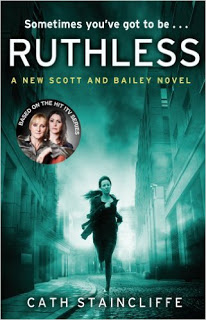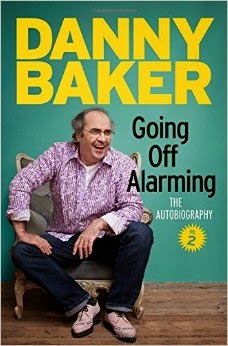In need of cheap soup and rich gossip, most lunch times Alan would wander to the Victoria Cafe, the social heart of the art school, open to students and casual interlopers, where the vain and resplendent gathered in conspicuous segregation according to their different artistic disciplines. Alan and Edwyn's catchpenny clothes stirred scornful laughs from the puffy new romantic posters of the fashion school, but complemented the surrounding second-hand fixtures and fittings, plucked from an original site in Govanhill which had been due for demolition until rescued and reinstalled by the architecture students. The queen of the Vic was a big Irish woman called Mona, who specialised in assuring all patrons that the soup was vegetarian as she hauled the thigh bone of some poor slain unspecified beast from the same bubbling cauldron, and whose short-fuse hospitality blew at regular intervals in her cutlery-bending yell, 'Get outta ma cafe!'
The aloof fashion fops and their equilateral hair-dos aside, the art-school crowd and those who buzzed around its cafe and weekend discos were a sweet, oblivious antidote to the nice bores Alan had suffered at university. They were funny, nutty, fascinating and, to Steven's barely concealed annoyance, invariably 'greeeeeeat!'
The roll call of human specimens read as follows:
A candied darling who called himself 'Lucy Lastic'; who knew 'they' could never touch him for dragging up Sauchiehall Street as long as he didn't wear women's knickers; who knew no fear when it came to roaring 'fab doll!' at men the size of shipyards; who knew no shame when it came to recounting the gory details of his latest straight-corrupting conquest with his starter for ten, 'I've just been shafted'; and whose ultimate destiny in certain surgical procedures was beyond all reasonable doubt.
Jill Bryson, a pretty polka-dot Alice looking as if she'd missed the bus for Wonderland and ended up in Glasgow by mistake, living on the Great Western Road with her boyfriend and the rampant 'Lucy' in a flat below a dentist's surgery which rattled daily to the sound of drilling enamel.
Peter McArthur, Jill's boyfriend, a photography student and Southside punk who'd first befriended Edwyn at Glasgow College of Building and Printing, and later bewitched Alan with his shared love of Fellini, Pasolini, Cabaret and his unused ticket stub for the Pistols' phantom Apollo show.
Drew McDowall, a performance poet from Paisley, and his young wife Rose from The Wee Scone Shop. When not surreptitiously handing out free pies to fellow punks under her boss's nose, Ross also played drums in Drew's band The Poems, once joined on stage by Edwyn and James for 'a musical recitation' of the hunting scene from War And Peace.
Gerry Hanley, Alan's usual lunchtime companion, who allowed him to join her cafe table of angry women in boiler suits, monkey boots and cropped hair, who shared a flat with the painter Adrian Wiszniewski and who herself, sometimes, could be coaxed on stage by Alan for a spot of performance art.
The tweedy man out of time called Malcolm Fisher, sufferer of untold allergies and pianist of unending jazz flourishes, who danced with his hands glued inside his raincoat pockets, whose flat, a chintz flock and floral eyesore like something from 101 Dalmatians, he shared with his similarly allergic sister.
And a punk graphic designer called Robbie Kelly, whose brother had very briefly strummed chords for the mythical Oscar Wild, and whose girlfriend, Anne, was usually seen pushing a shopping trolley down the street with a doll sat up front like a genuine baby.
As far as Alan was concerned, his new art school associates' rapturous reception to Orange Juice was an exploding plastic inevitability. He wouldn't be disappointed.
Detonation date was Friday 20 April 1979, as James Callaghan took forlorn stock of his final hours in Number 10 and as Art Garfunkel's 'Bright Eyes' bunny-hopped at number one somewhere above the shaking body of Michael Jackson, the wondering why of Sister Sledge and recently deposed yet eternally resilient Gloria Gaynor. The 1980s were but one catastrophic landslide victory and a few spins of the glitterball away. The perfect time for Orange Juice, a name so wrong that it had to be right, to yodel their first Lifebuoy-scrubbed 'hello' to the universe.








